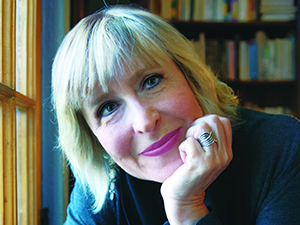Gold and Secrets: James Kendrick in Conversation with Irena Karafilly

Irena Karafilly, whose story "A Visit to the Dentist" appears in the Malahat's Winter 2017 issue, discusses early childhood, exposure as a writer, and unnerving dental experiences with Malahat volunteer James Kendrick.
Irena Karafilly was born in the Urals but crossed several borders while learning to walk, talk, read, and write. She has lived in five countries, most recently in Greece, where some of her plots are set. She speaks several foreign languages badly, swears perfectly in Polish and Greek, and writes in English about immigrants and other outsiders. Her stories have been broadcast, anthologized, and published in Canada and abroad. Author of five books, she has won several literary prizes, including the National Magazine Award and the CBC Literary Award. Her latest novel, THE HOUSE ON SELKIRK AVENUE, has recently been published by Guernica Editions.
You’re working on finishing up a book right now—could you talk a little bit about what it’s about, and why you’re excited about it?
Walking The Dog is a collection of short stories, some of them previously published or broadcast over the CBC. The stories deal with rather ordinary relationships and activities, which, for one reason or another, go awry, often illuminating larger concerns. I have been writing short stories for many years, but this is only my second collection. There are stories about childhood, adolescence, old age; about marriage, parenthood, sibling rivalry, etc. I have travelled widely, so the stories are set in various countries, but the issues they explore are, I think, universal.
Why do you think it’s important for authors to publish in literary magazines in addition to single-author formats such as novels, short story collections, etc.?
Sometimes it's the only exposure writers can hope to have for their short fiction. It is increasingly difficult to find publishers interested in taking on story collections, so having a strong publication record sometimes helps capture an editor's interest.
Your short story “A Visit to the Dentist,” set to appear in Issue #201 of the Malahat, has a very specific setting, both temporally and geographically. I wonder if you could talk a little bit about why you chose it and what it means to you?
The child's early experience in the dentist's office is autobiographical—a rare thing in my stories. The fictional experience is, perhaps, more traumatic than mine was because the sense of betrayal and loss of trust is thematically linked to the larger conflict in that part of the world. I happened to visit Croatia in the late 1990s and talked to people from several ethnic groups still trying to get their bearings after the recent war. I had no intention of fictionalizing any of it until one day, back in Canada, I went to see a dentist and, the same week, happened to meet an immigrant from the former Yugoslavia. I don't think I've ever gone to the dentist's without fleetingly recalling my first, unnerving, dental experience. I suppose I'd always wanted to write about it, but I never expected the story to find its way to Zagreb, with recurring allusions to the political conflicts in the region.
The story has very strong themes of violence, particularly physical violence, which run throughout. Is this typical of your writing?
Not really. My work occasionally deals with the consequences of war or violent conflict, but there is very little depiction of violence as such. What happens in the dentist's office is, on the face of it, a minor sort of event, but, if I've succeeded in what I tried to do, Vera's intense sense of betrayal does hint at the tragic realities which she is just beginning to grapple with.
I found the recurring images of gold in “A Visit to the Dentist” extremely interesting. Could you give us some insight into what is going on there?
Hm. I confess I didn't realize it was as interesting as all that, but, as you know, not everything an artist does happens at a conscious level. My father, like Vera's, was a jeweller and the scene where gold is first mentioned is one I remember from my own childhood. Much of what happens in the story is meant to communicate Vera's sense of exclusion from the adult world and her on-going need to make sense of things no one bothers to explain to her. I needed a scene in which six-year-old Vera overhears something she is not meant to know and the scene with the father's client made it possible for me to achieve my purpose. We don't know why the client comes to the family residence, instead of the father's place of business, but the child says the two men "looked as thick as thieves, hoarding gold and secrets," so she seems to sense something a little furtive about the situation.
How does the child's final act relate to everything preceding that powerful scene?
Most of the characters in the story bear the scars of war in one way or another and, to me, there is a sad irony in the fact that, though Vera is still very young, and does not understand anything about the regional horrors, her own reaction seems to mirror the violence of the setting in which her private struggles take place. She herself is appalled by what she has done, and I think—I hope—that readers are moved by her anguish and her bewilderment.

James Kendrick
* * * * * * * *









